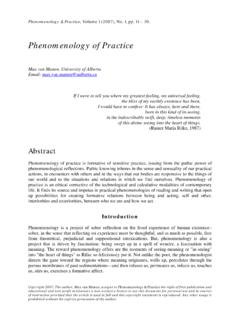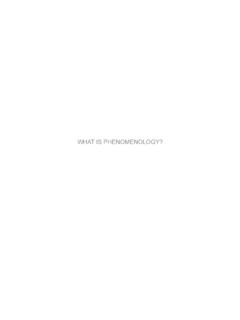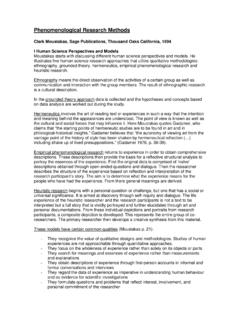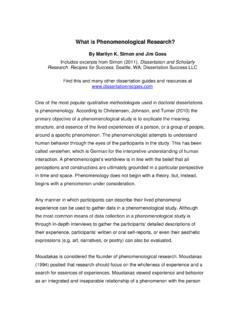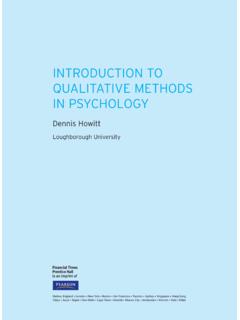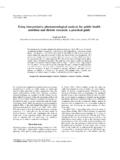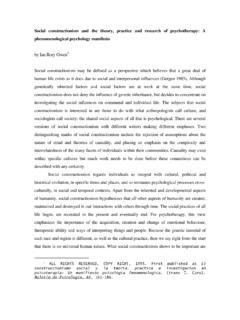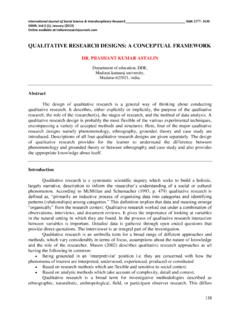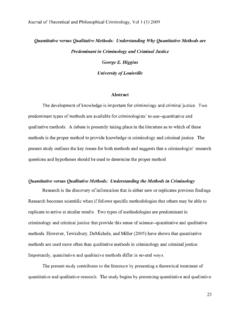Transcription of Writing Qualitatively, or the Demands of Writing
1 HEALTH research / May 2006van Manen / Writing QUALITATIVELYK eynote Address:Third Nordic InterdisciplinaryConference on Qualitative MethodsWriting Qualitatively, or the Demands of WritingMax van ManenHave you ever said this or heard someone say this: I have done all of my data analysis I just have to write it down. Or, I just have to write it up ? I will suggest that within thecontext of phenomenological inquiry, it is not necessarily helpful to try to assist researcherslearning how to write down their reflections or how to write up their results.
2 Whatshould be more helpful is learning how to write. Qualitative Writing may be seen as anactive struggle for understanding and recognition of the lived meanings of the lifeworld, andthis Writing also possesses passive and receptive rhetoric dimensions. It requires that we beattentive to other voices, to subtle significations in the way that things and others speak tous. In part, this is achieved through contact with the words of others. These words need totouch us, guide us, stir :space of Writing ; phenomenological method; phenomenological reflection;gaze of Orpheus; desire; hypomnesis; anamnesis; primal impressionalconsciousnessThe role, meaning, and significance of Writing are rarely problematized in theliterature of qualitative human science methods .
3 One seldom asks, How doeswriting enter the process of research ? Where does Writing begin? What is the rela-tion between Writing and method of inquiry? How do phenomena of everyday lifebelong to the space of the text? How is this textual space (the textorium) of writingexperienced? What is the phenomenology of Writing , or how can this Writing bewritten?Theassumptionthatneedstobeexam inedisthatqualitative(phenom-enological) inquiry cannot really be separated from the practice of Writing . Themore committed we are to a seriously qualitative (and thus less technical) form of713 AUTHOR S NOTE:This article was originally presented as a keynote address entitled Writing (up)Qualitative research for the Health Sciences: From Hypomnesis to Anamnesis at the Third NordicInterdisciplinary Conference on Qualitative methods in the Service of Health, Arhus, Denmark, on May5, HEALTH research , Vol.
4 16 No. 5, May 2006 713-722 DOI: 2006 Sage Publicationsinquiry, the more we should resist the temptation to surrender to a view of methodthat hollows out our understandings and cuts us off from the deeper sources ofmeaning. In the following pages, the meaning and place of Writing in qualitativeand phenomenological research are AND MEANING: BETWEEN LOGIC AND RHETORICThe one scholar who is generally identified as being concerned with Writing in vir-tually all his work, is Derrida. In hisSpeech and Phenomena(1973), Derrida posedquestions fundamental to the work of Husserl that have important consequencesfor phenomenology and the problem of Writing .
5 These questions are still andactively debated in the publications of Husserl scholars such as Zahavi (2003).Derrida s study of Husserl s foundational textLogical Investigationsis not easyreading for nonphilosophers, but it nevertheless had a major impact on theHusserlian project of phenomenology. In his preface to the English translation ofSpeech and Phenomena, Garver suggested that the best way to understand Derrida scritique of phenomenology ( , Husserlian phenomenology) is in terms of the radi-cal turn in philosophy from a logic- to a rhetoric-based approach to language andmeaning.
6 Garver used the old medieval triad of grammar, logic, and rhetoric toexplain this shift in the tradition of philosophy and the wider human it might be an exaggeration to say that Derrida reversed the role of logicand rhetoric, it is nevertheless obvious that he loosened the boundaries betweenphilosophy, literature, ethics, and critical approaches in the this frame, Derrida s deconstructionist reading of Husserl s phenomen-ology is very much in keeping with what had been happening in the works of otherscholars such as Heidegger (1971, 1982), the later Wittgenstein (1997), and Ricoeur(1976).
7 In their writings, there is a shift away from understanding meaning in termsof the relation between name and reference, perceived objects and mental objects,and a move toward the changing contexts of meaning in which human beings findthemselves, and to the complexity and instability of textual meaning, the languagegames and narrative practices that give expression and interpretation to s (1973) analysis seems particularly pointed when we consider the pres-ent scene of philosophy and phenomenology. Furthermore, these considerationsare critical for thinking about the work done in the human sciences, where inquiriesare placed in the service of professional practices such as nursing and pedagogy, infields of the health sciences, education, clinical psychology, and so now see in the work of scholars such as Nussbaum (1990), Lingis (2001), andmany others a decisive turn toward rhetorical practices that are still disconcerting inthe eyes of some philosophers.
8 Why? Because they imply different ways of thinkingabout meaning and language, literature and philosophy, narrative and scientificdiscourses, ontics and ethics, and therefore about the very project of inquiry andwriting provocative example can be gleaned from the textA Taste for the Secretthatcontains conversations between Derridaand the Italian philosopher Ferraris(Derrida & Ferraris, 2001). These are largely discussions about the role and signifi-cance of Writing . Ferraris complains that so much philosophy seems to have taken anarrative turn, and he poses the question to Derrida: How does Writing enter714 QUALITATIVE HEALTH research / May 2006philosophy?
9 (p. 7). Ferraris questions the generally accepted version of thisentrance, which holds that after the end of metaphysics, philosophers are no longerdealing with truth but are serving something like a sort of social welfare servicebased on conversation (p. 7). Ferraris is troubled by the new tolerance for lettingphilosophers do whatever they wish, with the exception of their proper work,which is, in his words, the search for truth (p. 8). This tolerance is actually repres-sive, he said, as it leads to the historical circumstance in which philosophy hasbecome just another form of literature.
10 Not unexpectedly, Ferraris is provocatively contradicted by Derrida, whocounters, Writing did not enter philosophy, it was already there (Derrida &Ferraris, 2001, p. 8). Derrida continues, This is what we have to think about abouthow it went unrecognized, and the attempts to repudiate it (p. 8). However, inpassing, Derrida agrees with Ferraris that truth is not outmoded. Truth is not avalue one can renounce, he says (p. 8). Derrida points out that Writing is essentialto all philosophic reflection and that it is worthwhile to think about the relationbetween phenomenology or philosophy in general and Writing in is in the act of reading and Writing that insights emerge.



